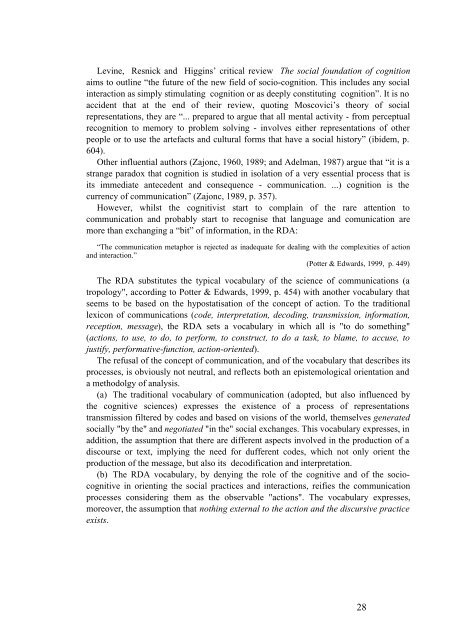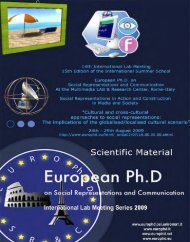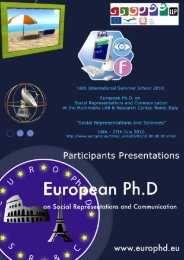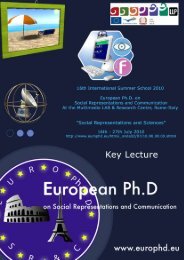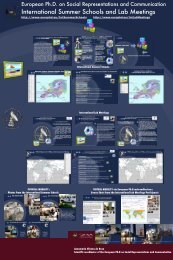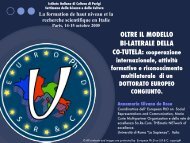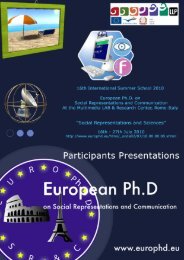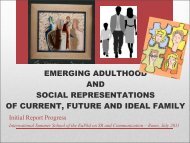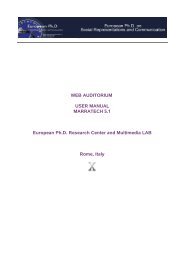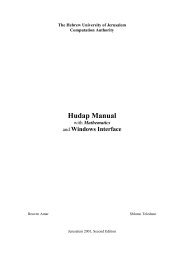The "boomerang" effect of the radicalism in discourse analysis
The "boomerang" effect of the radicalism in discourse analysis
The "boomerang" effect of the radicalism in discourse analysis
You also want an ePaper? Increase the reach of your titles
YUMPU automatically turns print PDFs into web optimized ePapers that Google loves.
Lev<strong>in</strong>e, Resnick and Higg<strong>in</strong>s’ critical review <strong>The</strong> social foundation <strong>of</strong> cognition<br />
aims to outl<strong>in</strong>e “<strong>the</strong> future <strong>of</strong> <strong>the</strong> new field <strong>of</strong> socio-cognition. This <strong>in</strong>cludes any social<br />
<strong>in</strong>teraction as simply stimulat<strong>in</strong>g cognition or as deeply constitut<strong>in</strong>g cognition”. It is no<br />
accident that at <strong>the</strong> end <strong>of</strong> <strong>the</strong>ir review, quot<strong>in</strong>g Moscovici’s <strong>the</strong>ory <strong>of</strong> social<br />
representations, <strong>the</strong>y are “... prepared to argue that all mental activity - from perceptual<br />
recognition to memory to problem solv<strong>in</strong>g - <strong>in</strong>volves ei<strong>the</strong>r representations <strong>of</strong> o<strong>the</strong>r<br />
people or to use <strong>the</strong> artefacts and cultural forms that have a social history” (ibidem, p.<br />
604).<br />
O<strong>the</strong>r <strong>in</strong>fluential authors (Zajonc, 1960, 1989; and Adelman, 1987) argue that “it is a<br />
strange paradox that cognition is studied <strong>in</strong> isolation <strong>of</strong> a very essential process that is<br />
its immediate antecedent and consequence - communication. ...) cognition is <strong>the</strong><br />
currency <strong>of</strong> communication” (Zajonc, 1989, p. 357).<br />
However, whilst <strong>the</strong> cognitivist start to compla<strong>in</strong> <strong>of</strong> <strong>the</strong> rare attention to<br />
communication and probably start to recognise that language and comunication are<br />
more than exchang<strong>in</strong>g a “bit” <strong>of</strong> <strong>in</strong>formation, <strong>in</strong> <strong>the</strong> RDA:<br />
“<strong>The</strong> communication metaphor is rejected as <strong>in</strong>adequate for deal<strong>in</strong>g with <strong>the</strong> complexities <strong>of</strong> action<br />
and <strong>in</strong>teraction.”<br />
(Potter & Edwards, 1999, p. 449)<br />
<strong>The</strong> RDA substitutes <strong>the</strong> typical vocabulary <strong>of</strong> <strong>the</strong> science <strong>of</strong> communications (a<br />
tropology", accord<strong>in</strong>g to Potter & Edwards, 1999, p. 454) with ano<strong>the</strong>r vocabulary that<br />
seems to be based on <strong>the</strong> hypostatisation <strong>of</strong> <strong>the</strong> concept <strong>of</strong> action. To <strong>the</strong> traditional<br />
lexicon <strong>of</strong> communications (code, <strong>in</strong>terpretation, decod<strong>in</strong>g, transmission, <strong>in</strong>formation,<br />
reception, message), <strong>the</strong> RDA sets a vocabulary <strong>in</strong> which all is "to do someth<strong>in</strong>g"<br />
(actions, to use, to do, to perform, to construct, to do a task, to blame, to accuse, to<br />
justify, performative-function, action-oriented).<br />
<strong>The</strong> refusal <strong>of</strong> <strong>the</strong> concept <strong>of</strong> communication, and <strong>of</strong> <strong>the</strong> vocabulary that describes its<br />
processes, is obviously not neutral, and reflects both an epistemological orientation and<br />
a methodolgy <strong>of</strong> <strong>analysis</strong>.<br />
(a) <strong>The</strong> traditional vocabulary <strong>of</strong> communication (adopted, but also <strong>in</strong>fluenced by<br />
<strong>the</strong> cognitive sciences) expresses <strong>the</strong> existence <strong>of</strong> a process <strong>of</strong> representations<br />
transmission filtered by codes and based on visions <strong>of</strong> <strong>the</strong> world, <strong>the</strong>mselves generated<br />
socially "by <strong>the</strong>" and negotiated "<strong>in</strong> <strong>the</strong>" social exchanges. This vocabulary expresses, <strong>in</strong><br />
addition, <strong>the</strong> assumption that <strong>the</strong>re are different aspects <strong>in</strong>volved <strong>in</strong> <strong>the</strong> production <strong>of</strong> a<br />
<strong>discourse</strong> or text, imply<strong>in</strong>g <strong>the</strong> need for dufferent codes, which not only orient <strong>the</strong><br />
production <strong>of</strong> <strong>the</strong> message, but also its decodification and <strong>in</strong>terpretation.<br />
(b) <strong>The</strong> RDA vocabulary, by deny<strong>in</strong>g <strong>the</strong> role <strong>of</strong> <strong>the</strong> cognitive and <strong>of</strong> <strong>the</strong> sociocognitive<br />
<strong>in</strong> orient<strong>in</strong>g <strong>the</strong> social practices and <strong>in</strong>teractions, reifies <strong>the</strong> communication<br />
processes consider<strong>in</strong>g <strong>the</strong>m as <strong>the</strong> observable "actions". <strong>The</strong> vocabulary expresses,<br />
moreover, <strong>the</strong> assumption that noth<strong>in</strong>g external to <strong>the</strong> action and <strong>the</strong> discursive practice<br />
exists.<br />
28


